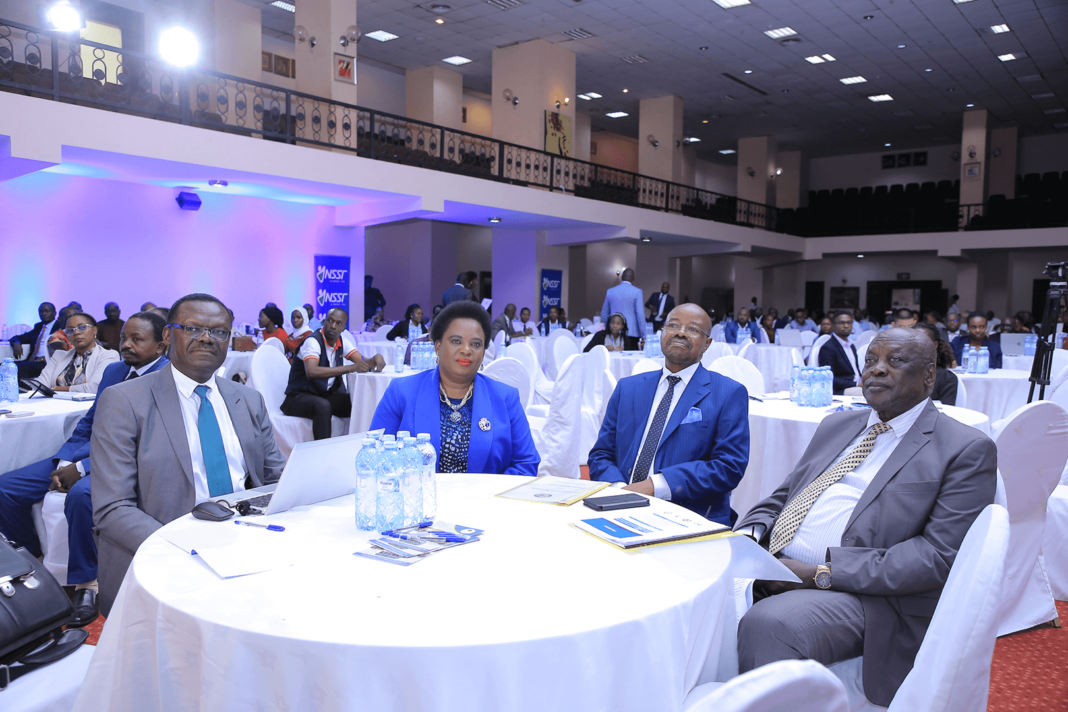The National Social Security Fund (NSSF) in collaboration with the Ministry of Energy and Mineral Development has joined various participants and stakeholders from the energy sector for a sensitization workshop aimed at bolstering adherence to social security regulations in light of the NSSF Act as amended in 2022.
The workshop is being held at Fairway Hotel in Kampala and will end on Friday under the theme; “Enhancing Stakeholders Knowledge and Practical Actualization of the Mining Legal Framework for Compliance and Development”.
This new law mandates all employers to duly register their companies and fulfill social security contributions, irrespective of the number of employees.
This workshop is an essential platform to consolidate and operationalize the partnership, following productive dialogues that have taken place between the Ministry of Gender, Labor and Social Development, NSSF, and the Ministry of Energy and Mineral Development, alongside relevant agencies and stakeholders with the overarching goal of advancing social security compliance within the Energy, Oil &Gas, and Minerals Sub-Sectors.
Agnes Isharaza , NSSF Secretary and Head of Legal Affairs said that this workshop is for stakeholders and participants in the energy sector to appreciate how they fit into this Social Security story, and how the employer and employees relate with the Fund in this whole process of compliance.
“It is expected by the government that member organizations have social security arrangements in place for their citizens. It is the obligation of the state to ensure that its citizens are able to spend for themselves as far as the basic requirements to live and survive are concerned,” Isharaza said.
She added, “Our law requires that every month the employer deducts 5% from the employee’s gross salary, tops that up with 10% and remits it to the Fund. The Fund then has an obligation to invest this mandatory contribution.”
Isharaza further revealed that one of the mandates of the Fund, tasked to the board is to ensure that they preserve and grow members’ savings. When the Fund gets the 15%, they invest and grow it so that the member gets a better return when they become eligible to claim their benefits. Right now the Fund invests in 3 asset classes; Fixed Income, Equities and Real Estate.
“Under equities, we invest in listed companies principally and from those, we earn dividends depending on how the companies are performing. If you see the listed companies doing well as a member, you get excited when they’re not doing well, then you know there’s a dump on your return. We can also invest in private equity but private equity comes with a lot of challenges, mainly around governance,” she noted.
The Fund also invests in Fixed Income, government securities which are the largest and safest and most profitable asset class. The third category is real estate where the Fund earns income through rental income or purchase of some of our projects like Solana that you see being advertised.
Patrick Ayota, NSSF Managing Director said that about 25 years ago, the average life expectancy in Uganda was 43. At that point, it was a glamour saying, no NSSF, you can’t tell us to come and get our benefits when our life expectancy is 43 because it didn’t make sense. However, now we are at a life expectancy average of 63. Interestingly enough, the ladies are at 64 and the men are at 62. So for some reason, the ladies are living longer than us.
“We are beginning to live longer, if you think about it, in your village, there are more 70-year-olds walking around. Some of your uncles, aunts and grandmothers are even 100; we now have more 100-year-olds than we did 20 years ago. The danger is that if you retire and claim your savings at 55 and you are going to live for another 20 years, what happens to you,” he said adding, “That is the problem we have as a nation. The question is how will we live in a society where we have many aging friends but no savings or Social Security? We are all responsible for changing this.”
Ayota added that the Fund has an obligation to look at Uganda today and begin investing for Uganda tomorrow and nobody can do it but stakeholders. The long-term savings are at 11%, 10% of that is with NSSF and those are low. As a country, something must be done.
“As NSSF our job is to see what we can do to turn the situation around. What can you do in your company to turn this situation of a low savings culture around? Remember, this is not just about your life. Many of you have children. They are going to be here when you are not, so you begin to think what do I need to be doing today? Where I am? Bring the change,” he urged.
He further said that in order to accelerate the interest of Uganda to join the Club of Africa economic giants, at a minimum long term savings must be encouraged.
“So what are we doing in NSSF? We’re now moving on a couple of grounds. The first one is to increase the willingness to save, through education, awareness, and partner shifts like the one we are having here,” he noted.
Speaking on the same event, the Minister of State for Mineral Development Hon. Peter Lokeris has said the Minerals have increased foreign Direct Investments in the sector from $5m in 2003 to $800m.
“We expect to implement the Mineral Resources Infrastructural Development Project this financial year” said Hon. Peter Lokeris
NSSF kickoffs workshop to sensitize Energy sector stakeholders on bolstering adherence to social security regulations

- Advertisement -




This website was… how do I say it? Relevant!!
Finally I’ve found something that helped me. Thanks!